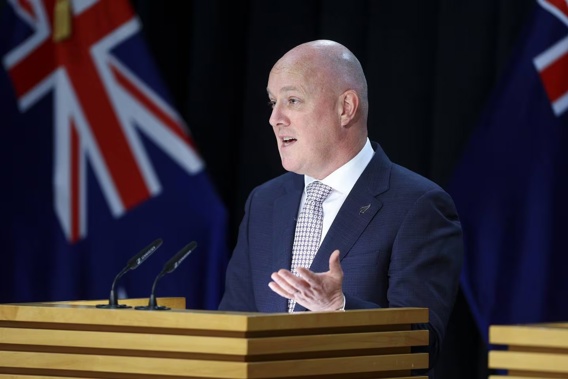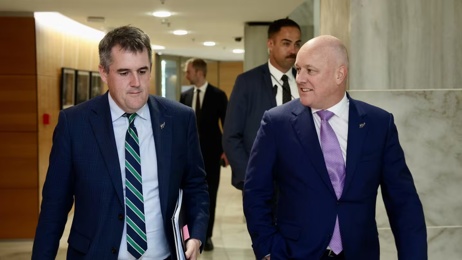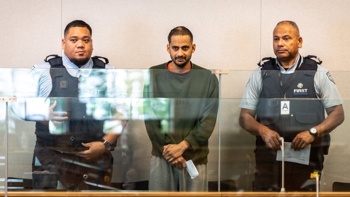
New Zealand now considers Hamas’ political wing a terrorist entity after the militant group’s attacks on Israel in October last year.
The Government also announced travel bans on several extremist Israeli settlers who have committed violent attacks against Palestinians in the West Bank.
In the wake of Hamas’ October 7 attack on southern Israel, Israel’s air, sea and ground campaign in Gaza has killed tens of thousands of people, obliterated large swaths of the urban landscape and displaced 80 per cent of the battered enclave’s population.
Prime Minister Christopher Luxon and Foreign Affairs Minister Winston Peters today released a statement confirming Hamas’ political wing had joined its military wing as being designated a terrorist entity.
The Palestinian group’s military wing was given the designation in 2010. Former Prime Minister Chris Hipkins asked for advice on whether to do the same regarding Hamas’ political wing after the October 7 attacks which have led to a bloody offensive by Israel to root Hamas out of Gaza.
“... what happened on 7 October reinforces we can no longer distinguish between the military and political wings of Hamas. The organisation as a whole bears responsibility for these horrific terrorist attacks,” Peters said, while also continuing his call for peace in the region.
Such a designation froze any New Zealand assets held by the entity, as well as making it a criminal offence to carry out property or financial transactions with them.
Luxon clarified the designation was about Hamas’ actions and not the Palestinian people more broadly.
“This designation targets Hamas, not the provision of private humanitarian support to Palestinian civilians.
“Similarly, the designation does not stop New Zealand providing humanitarian and future development assistance to benefit civilians in Gaza, nor does it stop us providing consular support to New Zealand citizens or permanent residents in the conflict zone.”
/cloudfront-ap-southeast-2.images.arcpublishing.com/nzme/YNOLDGF5WRALHAUU5PANKNPQQ4.jpg)
Prime Minister Christopher Luxon made clear the designation was about Hamas’ actions and not the Palestinian people more broadly. Photo / Hagen Hopkins
Luxon and Peters also announced travel bans on those establishing Israeli settlements in Palestinian territories, meaning they would not be able to travel to New Zealand.
“New Zealand is seriously concerned by the significant increase in extremist violence perpetrated by Israeli settlers against Palestinian populations in recent months. This is particularly destabilising in what is already a major crisis,” Luxon said.
Peters argued the settlements, and the violence perpetrated by settlers, undermined the prospect of a two-state solution.
“Recent statements by some Israeli ministers about plans for further settlement construction are of serious concern and will raise tensions further between Israelis and Palestinians,” he said.
“The international community is overwhelmingly in favour of a future Palestinian state as part of a negotiated two-state solution.”
Govt installs more Russia sanctions
In a third press statement this afternoon, Peters announced fresh sanctions on Russia amid its illegal invasion of Ukraine.
Those sanctions were:
- Implementation of the G7-plus price cap on Russian-origin oil;
- making explicit the prohibition on exporting restricted items to Russia and Belarus through third countries; and
- designating 61 individuals and companies to counter evasion efforts.
Ceasefire likelihood played down
The announcements come as Israel and Hamas played down chances of an imminent breakthrough in talks for a ceasefire in Gaza.
Talks to pause the fighting between Israel and Hamas have gained momentum recently and were under way on Tuesday. Negotiators from the United States, Egypt and Qatar have been working to broker a cease-fire that would result in Hamas freeing some of the dozens of hostages it holds in exchange for the release of Palestinian prisoners, a six-week halt in fighting and an increase in aid deliveries to Gaza.
The start of Ramadan, which is expected to be around March 10, is seen as an unofficial deadline for a deal. The month is a time of heightened religious observance and dawn-to-dusk fasting for hundreds of millions of Muslims around the world. Israeli-Palestinian tensions have flared in the past during the holy month.
“Ramadan’s coming up, and there has been an agreement by the Israelis that they would not engage in activities during Ramadan as well, in order to give us time to get all the hostages out,” Biden said in an appearance on NBC’s Late Night With Seth Meyers that was recorded earlier this week.
Palestinians line up for a free meal in Rafah in the Gaza Strip as international aid agencies say Gaza is suffering from shortages of food, medicine and other basic supplies as a result of the war between Israel and Hamas. Photo / AP
In separate comments, Biden said he hoped a cease-fire deal could take effect by next week.
Israeli officials said Biden’s comments came as a surprise and were not made in co-ordination with the country’s leadership. A Hamas official played down any sense of progress, saying the group wouldn’t soften its demands.
The Israeli officials, who spoke on condition of anonymity because they weren’t authorised to discuss the sensitive talks with the media, said Israel wants a deal immediately, but that Hamas continues to push excessive demands. They also said that Israel is insisting female soldiers be part of the first group of hostages released under any truce deal.
- Additional reporting: AP
Adam Pearse is a political reporter in the NZ Herald Press Gallery team, based at Parliament. He has worked for NZME since 2018, covering sport and health for the Northern Advocate in Whangārei before moving to the NZ Herald in Auckland, covering Covid-19 and crime.
Take your Radio, Podcasts and Music with you

/cloudfront-ap-southeast-2.images.arcpublishing.com/nzme/TKHE7QGYLRF4FKPRZP4MP6ZGYE.JPG)








